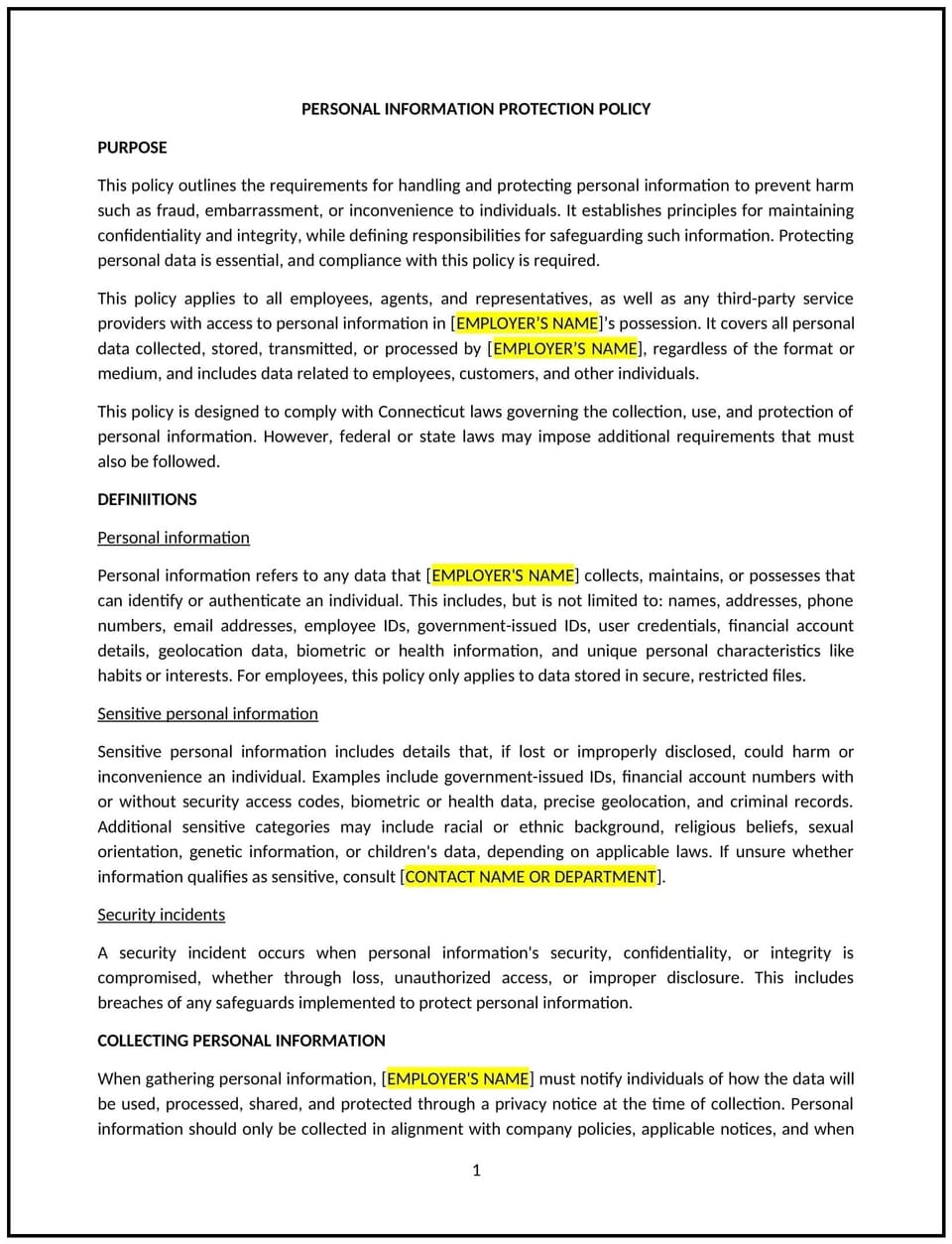Personal information protection policy (Connecticut): Free template

Personal information protection policy (Connecticut)
A personal information protection policy helps Connecticut businesses ensure the confidentiality, integrity, and security of personal information collected from employees, customers, and other stakeholders. This policy outlines the company’s commitment to safeguarding personal data, complying with data protection laws, and establishing clear procedures for handling, storing, and disposing of personal information.
By implementing this policy, businesses can mitigate the risk of data breaches, comply with relevant privacy laws, and protect sensitive information from unauthorized access, ensuring that personal data is handled responsibly and securely.
How to use this personal information protection policy (Connecticut)
- Define personal information: Clearly define what constitutes personal information under this policy, including data such as names, addresses, Social Security numbers, financial information, health records, and other identifying information.
- Identify data collection and storage practices: Establish guidelines for how personal information will be collected, stored, and processed, ensuring that it is protected throughout its lifecycle.
- Set security measures: Outline the security protocols in place to protect personal information from unauthorized access, loss, or theft, including encryption, access controls, and secure storage methods.
- Ensure data access control: Specify who is authorized to access personal information and under what circumstances, ensuring that only authorized personnel handle sensitive data.
- Address data sharing and third-party vendors: Define the process for sharing personal information with third parties, including vendors and partners, and ensure that third-party service providers comply with privacy and security standards.
- Define data retention and disposal: Set clear guidelines for retaining personal information for the necessary period and securely disposing of or anonymizing data when it is no longer needed.
- Compliance with laws: Ensure the policy complies with applicable state and federal laws, including the Connecticut Data Privacy Act, the General Data Protection Regulation (GDPR), and the California Consumer Privacy Act (CCPA), as well as industry standards for data protection.
Benefits of using this personal information protection policy (Connecticut)
This policy offers several benefits for Connecticut businesses:
- Protects sensitive data: Ensures that personal information is protected from unauthorized access, reducing the risk of data breaches and protecting the privacy of employees, customers, and partners.
- Promotes trust: By safeguarding personal information, the company builds trust with customers and employees, demonstrating a commitment to their privacy and security.
- Complies with privacy laws: Helps the business comply with state, federal, and international privacy laws, avoiding legal risks and penalties associated with non-compliance.
- Minimizes legal risks: By ensuring that personal data is properly protected, businesses can reduce the risk of lawsuits, regulatory fines, and reputational damage due to data breaches.
- Improves data governance: Establishes clear data handling procedures, which improves overall data governance, ensuring that personal information is used and stored responsibly across the organization.
Tips for using this personal information protection policy (Connecticut)
- Communicate the policy clearly: Ensure all employees understand their role in protecting personal information, including how to handle, store, and dispose of data securely.
- Provide training: Offer regular training on data privacy and security best practices to raise awareness and reduce the risk of accidental data breaches.
- Monitor compliance: Regularly audit data protection practices to ensure adherence to the policy, and take corrective actions as needed.
- Secure third-party contracts: Ensure that contracts with third-party vendors include provisions that hold them accountable for maintaining the privacy and security of personal data.
- Review periodically: Update the policy regularly to reflect changes in privacy laws, new security technologies, or business practices to ensure continued effectiveness and compliance.
Q: How does this policy benefit my business?
A: The policy helps protect sensitive personal information, ensuring compliance with privacy laws and reducing the risk of data breaches, legal claims, and reputational damage. It also builds trust with customers and employees by demonstrating the company’s commitment to data security.
Q: What types of personal information are covered by this policy?
A: The policy covers all types of personal information, including names, addresses, Social Security numbers, financial data, health information, and any other identifying data that the company collects or processes.
Q: How can I ensure personal information is protected?
A: Implement security protocols such as encryption, access control, and secure storage methods. Limit access to personal information to authorized personnel only and provide regular training to employees on data privacy best practices.
Q: Can personal information be shared with third parties?
A: Personal information may be shared with third parties only if necessary for business purposes and in compliance with applicable laws. Ensure that third-party vendors have adequate security measures in place to protect the data.
Q: How often should this policy be reviewed?
A: The policy should be reviewed annually or whenever there are changes to state or federal privacy laws, business operations, or security practices to ensure it remains effective and compliant.
This article contains general legal information and does not contain legal advice. Cobrief is not a law firm or a substitute for an attorney or law firm. The law is complex and changes often. For legal advice, please ask a lawyer.


